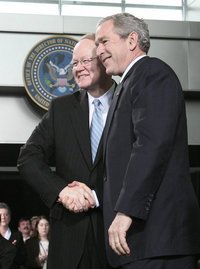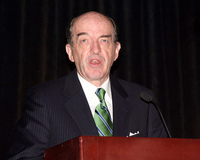 Well, I had been waiting to post something about the telcos and domestic
wiretapping until more news came out, since much of it was still hearsay.
But now National Intelligence Director and former National Security Agency
Director Mike McConnell has confirmed it:
Well, I had been waiting to post something about the telcos and domestic
wiretapping until more news came out, since much of it was still hearsay.
But now National Intelligence Director and former National Security Agency
Director Mike McConnell has confirmed it:
Now the second part of the issue was under the president’s program, the terrorist surveillance program, the private sector had assisted us. Because if you’re going to get access you’ve got to have a partner and they were being sued. Now if you play out the suits at the value they’re claimed, it would bankrupt these companies. So my position was we have to provide liability protection to these private sector entities.Ryan Singel points out in Wired’s Threat Level blog that this is even though the same McConnell signed a sworn declaration in April saying to reveal that NSA and Verizon had such a relationship “would cause exceptionally grave harm to the national security.” Continue reading— Transcript: Debate on the foreign intelligence surveillance act, By Chris Roberts, ©El Paso Times, Article Launched: 08/22/2007 01:05:57 AM MDT







